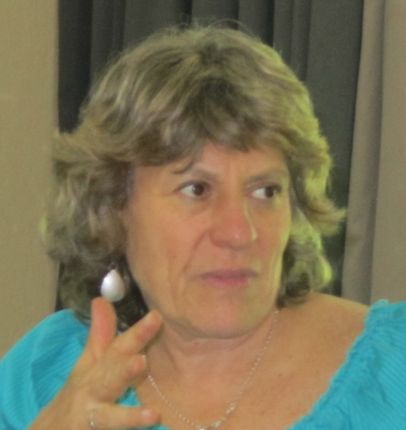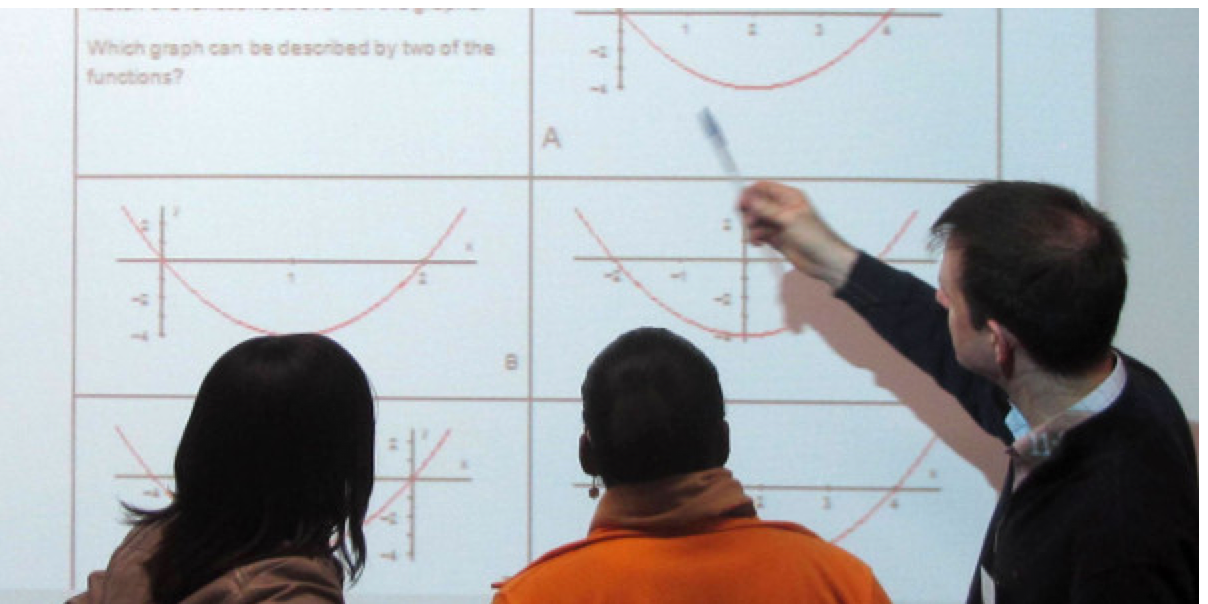Le point de vue de Jill Adler, avril 2016
Mathematics teacher professional development: A view from South Africa
Jill Adler est professeur à l'Université de Witwatersrand, Johannesburg, Afrique du Sud. Elle est lauréate de la médaille Hans Freudenthal, décernée par l'ICMI en 2015
 Not so long ago, at the 2008 Centennial conference of ICMI, Ole Skosmose challenged the mathematics education community with the observation that most of the research that builds models, concepts, constructs and visions for teaching and learning mathematics has been done on a small fraction of the worlds’ children. Critically, this research base has not been sufficiently informed by research in disadvantaged, underperforming public schools in low-income communities. Such schools constitute the majority in contemporary South Africa, where inequality and poverty prevail, despite two decades of a post-apartheid agenda to forge a new democratic order.
Not so long ago, at the 2008 Centennial conference of ICMI, Ole Skosmose challenged the mathematics education community with the observation that most of the research that builds models, concepts, constructs and visions for teaching and learning mathematics has been done on a small fraction of the worlds’ children. Critically, this research base has not been sufficiently informed by research in disadvantaged, underperforming public schools in low-income communities. Such schools constitute the majority in contemporary South Africa, where inequality and poverty prevail, despite two decades of a post-apartheid agenda to forge a new democratic order.
It is well known that poverty is strongly associated with poor educational outcomes. While there is compelling evidence that socio-economic status is the strongest predictor of educational success in school (OECD, 2013), recent studies of quality within schools have argued that ‘achievement in countries with very low per capita incomes is more sensitive to the availability of school resources’ (Gamoran & Long, 2006, p. 1). In schools serving low-income communities, the teacher is a critical resource. What then as mathematics educator researchers and teacher educators do we need to better understand if professional development interventions are to impact mathematics teaching and ways that improve attainment and so greater opportunities for their learners?
Developing mathematics teaching in South Africa (and I would contend in most of the developing world) requires an approach that fundamentally recognises its educational reality, and works to strengthen and enrich current practices. I make this claim based on an approach developed in the Wits Maths Connect Secondary Project (WMCS) – a five year (2010-2014) research and development project (now in its second phase) working with mathematics teachers in ten disadvantaged, underperforming schools in low income communities in one school district in South Africa. The difference in the WMCS approach, somewhat ironically, rests on building on and from similarity with current practices in those schools, rather than through a reform agenda in mathematics education whose constructs and models speak to a very different educational context.
WMCS is directed at a critical problem within South African education: the quality of learning and teaching mathematics in our secondary schools. Key to the work of WMCS is what we have called mathematical discourse in instruction (MDI). MDI characterises the teaching of a mathematics lesson as a sequence of examples/tasks, and the accompanying explanatory talk – two commonplaces in mathematics teaching – directed towards a particular object of learning. Learning is always about something, and so the work of teaching is essentially about bringing that something into focus with learners. Given the abstract nature of mathematics, this typically occurs through exemplification and explanatory talk. In the first year of the WMCS project, as we spent time in various mathematics classrooms, we observed that while these features of practice were in teachers’ repertoires, there was inadequate exemplification, with disconnections (some erroneous) between the examples selected, the explanations offered and the intended underlying mathematical ideas (Adler & Venkat, 2014; Venkat & Adler, 2012). Our starting assumption was that we needed to strengthen current practices as a first step towards improving instruction. Our approach was to provide teachers with further experience of learning mathematics, revisiting the mathematics they teach, and so deepening their understanding of this mathematics, as well as extending their engagement with mathematics beyond that in the school curriculum. Furthermore, it was to bring their attention to how they exemplify and explain in a lesson and how these could be improved.

Consequently, there are two components to the WMCS model. The first component comprises a professional development course (16-days spread over the school year) specifically designed for mathematics teachers, where attention is on key mathematical concepts in the curriculum, and the mathematical vantage points from which these need to be understood by the teacher herself, if they are to be adequately taught. The major emphasis and time in these courses is on mathematics (75%), studying ideas in depth, developing fluency in their use.
Roughly 25% of course time focuses on key elements of teaching these mathematical ideas, and what I referred to a MDI above. This forms part of the second component of the WMCS model, complementing the courses - a localised version of Lesson Study (the well-known Japanese model of professional development in use across the world), where teachers work together with a knowledgeable other on key features of mathematics teaching. It is well known that improving classroom practice requires working in and on the practice itself, and so on teaching. In the Japanese Lesson Study model this is typically located within a school and takes place during school hours where teachers have time for their professional development work, and they are supported in this work by a researcher or knowledgeable other. This form of the model is labour intensive, costly, impractical in over-crowded schools, and critically not viable given the shortage of knowledgeable others in South Africa. Each WMCS Lesson Study is organised once a term, over three weeks, after school, with teachers from the host school together with those from other schools in the project’s clusters of schools. MDI is the construct that frames the lesson study, and structures teachers’ work. Teachers plan their lesson(s) selecting first their object of learning (what they want learners to know and be able to do) and then their selection of examples, the tasks these are embedded in, and how they will build explanation in class and engage learners in this. MDI is thus the key construct that is both process and outcome of the WMCS, and functions productively across research and practice.
At one level, the WMCS approach is so obvious - start where we are and strengthen what is done mathematically. The underlying assumption is that changing teaching practices can and will follow. Typically, however, much mathematics professional development works in reverse. It focuses on teaching practice, typically through reform based notions of inquiry where learning evolves from engagement with mathematically rich tasks, and thus on the assumption that the disciplinary knowledge base for this work is in place, or that deepening of mathematics knowledge will result.
The results of WMCS to date are promising. As would be expected through a focused course of mathematics study, teachers’ mathematics improves. We have shown this through forms of pre and post tests. Significantly, learner performance improves. Grade 10 learners taught by teachers who had completed at least one of the courses outperformed a control group of learners. The gains for learners over one year of school were equivalent to two months of additional teaching. We report these results in Pournara, Hodgen, Adler & Pillay (2015), where we also explain how and why these results are indicative, but promising. The learning gains, still fell short of what we would consider competence in Grade 10 mathematics. This result is important. It highlights the depth and extent of problems in mathematics teaching and learning in school, and the considerable lag or gap in learners who are currently in Grade 10 in many of our schools. Learner performance results nevertheless suggest a positive link between professional development focused on mathematics, and designed specifically for practicing teachers, and the indirect impact of teachers’ related classroom instruction on their learners’ learning.
To investigate shifts in instruction over time we operationalised MDI into an analytic frame for studying teaching, and used it to compare video recordings of teachers’ teaching prior to and a year following their participation in course(s). In the MDI framework, ‘improvement’ is indicated by movement towards structure and generality (Adler & Ronda, 2015). Our analysis to date shows that exemplification, and aspects of explanatory talk improved across teachers (Adler & Ronda, 2014). Here too improvement is not uniform, nor across all elements of MDI. Task demand remained relatively low, and while lessons were more mathematically coherent, full attention on the underlying mathematical ideals, and engagement of learners was more elusive. Shifting practice, a deeply socio-cultural phenomenon is a long-term affair.
In my view, and based not only on WMCS results, but work in mathematics teacher education research and practice over two decades now, firmly grounded, deliberately focused work towards steady gains over time, may assist us traversing the gap between vision and reality that pervades much of the research reported on professional development in our field, and impact where the need is greatest.
Jill Adler, le 21 mars 2016
References
Adler, J., & Ronda, E. (2014). An analytic framework for describing teachers' mathematics discourse in instruction. Paper presented at the Psychology of Mathematics Education, Vancouver.
Adler, J., & Ronda, E. (2015). A framework for describing Mathematics Discourse in Instruction and interpreting differences in teaching. African Journal of Research in Mathematics, Science and Technology Education. doi:DOI:10.1080/10288457.2015.1089677)
Adler, J., & Venkat, H. (2014). Teachers’ mathematical discourse in instruction: Focus on examples and explanations. In M. Rollnick, H. Venkat, J. Loughran, & M. Askew (Eds.), Exploring content knowledge for teaching science and mathematics (pp. 132-146). London: Routledge.
Gamoran, A., & Long, D. A. (2006). Equality of educational opportunity: A 40-year retrospective. Working Paper 2006-9. Wisconsin Center for Education Research (WCER) Madison, WI.
OECD. (2013). OECD Economic Surveys: South Africa 2013. Retrieved from Pournara, C., Hodgen, J., Adler, J., & Pillay, V. (2015). Can improving teachers’ knowledge of mathematics lead to gains in learners’ attainment in mathematics? South African Journal of Education, 35(3), 10. doi:doi: 10.15700/saje.v35n3a1083
Venkat, H., & Adler, J. (2012). Coherence and connections in teachers’ mathematical discourses in instruction. Pythagoras, 33(3).
---------------

